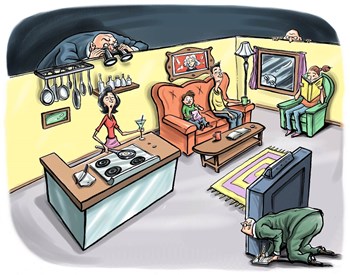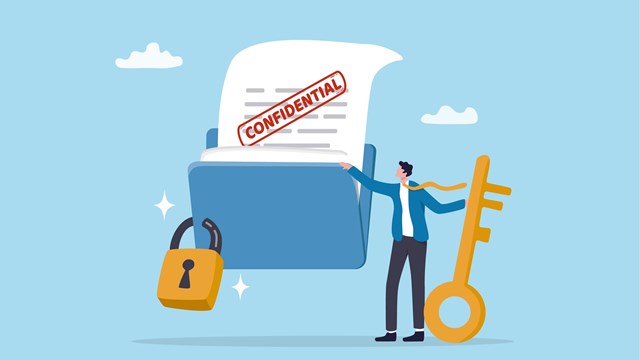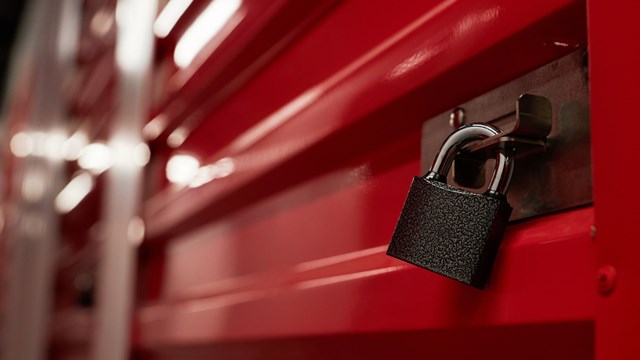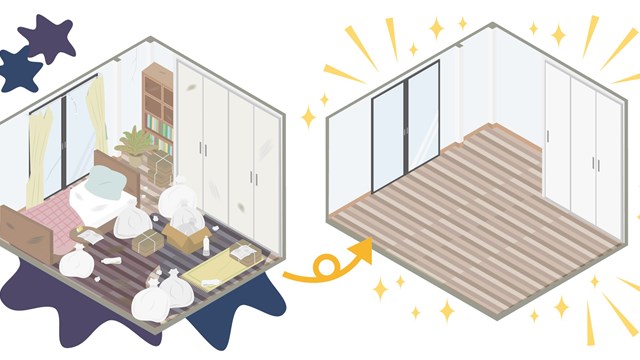
For time immemorial, the home has been synonymous with warmth, comfort and, most importantly, safety. The boards and managers who oversee co-op and condominium communities are aiming to preserve this image by ensuring that safety is their top priority, and that residents should harbor no fear in regard to their well-being, or the well-being of their families and property.
Of course, there must remain a line between a resident's safety and an intrusion upon a resident's privacy, of which a board or management must constantly be aware. With the broad range of technological options available today that purport to monitor and secure properties, their continual evolution is bound to stir up questions regarding privacy. But, for many communities, those issues are outweighed by a desire to have as many safeguards in place as possible.
A Watchful Eye
The ways in which co-op and condo communities approach security have changed over the years, moving from a reliance on security guards and regular patrols to more access control and visual monitoring. The days wherein a manager would hire a private investigator to sit outside and watch a building's entrance for riff-raff are long gone. And while concierges and security guards are still prevalent in New York City buildings, cameras do the heavy lifting when it comes to security monitoring.
The growth in the popularity of cameras can be heavily attributed to the increase of affordable technology in the marketplace, as well as their expanding functionality. "Cameras are on the rise, and, on quite a few occasions, I've been contacted by law enforcement, asking to view footage," says Jay Cohen, director of operations at A. Michael Tyler Realty Corp., a management company in Manhattan. "Oftentimes, they're quite successful in helping to apprehend a criminal because they're able to capture a very clear image of the perpetrator." Crimes prevented by providing police access to clear camera footage have included thefts, assaults, vandalism, and worse.
And the signs indicating that an area is being monitored can be a deterrent on their own. Dean Roberts, an attorney with the law firm of Norris McLaughlin & Marcus, P.A., with offices in Manhattan, New Jersey and Pennsylvania, notes that "while most people [who have nothing with which to be concerned] quickly forget that they are being taped, people inclined to do damage or otherwise misbehave in common areas are much more aware that they're being watched, and thereby refrain from doing anything nefarious in videotaped areas."
The criminal element isn't the only thing that cameras can help illuminate. As Michael Manzi, an attorney with the law firm of Balber Pickard Maldonado & Van Der Tuin in Manhattan notes, "cameras can provide evidence in connection with trip-and-falls and other tort cases."
Edward J. Mackoul, president of insurance agency Mackoul & Associates in Island Park, concurs. "There have been plenty of instances in which a claimant says that they fell because of negligence on the part of the property owner, but the cameras proved that there was no incident," he says.
"Cameras help prevent frivolous lawsuits," continues Mackoul. "In one specific instance, a person said that a lobby floor was wet, that there was no sign out to indicate such, and, because of this, they fell. They then sued for negligence. But the camera showed that there were in fact signs out marking the area as wet, and that the person tried to jump over the sign carrying bags, which caused the fall. In that way, cameras can have a positive impact on the loss history for a property."
Many cameras within residential properties are equipped with motion sensors, thereby allowing them to capture all of the above without wasting limited footage filming a dormant hallway. When an incident (or an injury) is primed to take place, the camera will be triggered to capture the entirety of the altercation/situation more likely than not.
Having these events on record is extremely useful from an insurance standpoint. If an incident is caught online, as Cohen explains, the camera footage can be presented directly to the insurance carrier, and, in the case of a personal injury claim, should it be proven fraudulent, that can benefit insurance premiums for everyone involved.
Wave of the Future
Almost everyone is familiar with the grainy camera footage or photographs that are regularly presented on the local evening news, accompanied by a newscaster warning that "if you've seen this person..." then you should contact the appropriate authorities. And everyone is similarly aware that, should they encounter the person depicted therein, they would have no idea, as the footage is indecipherable. This used to be the way of residential security as well, but modern cameras have made leaps and bounds from their older-fashioned counterparts. And they're more affordable to boot.
"The sophisticated high-definition cameras that are now available allow people to make out faces much better than they could in previous decades," says Cohen. "What was once out of reach from a price-point perspective is now affordable for many properties. There are now low-lux, HD, full-color cameras that are much more affordable to associations, and many buildings have taken advantage."
In days gone by, cameras recorded surveillance footage onto video tape that could be later viewed via VCR. Then, the advent of DVD allowed interested parties to assess camera feeds online. But now, according to Cohen, "the software has advanced to the point where you can download the recordings to your smart phone and watch them immediately, so you no longer need to be in front of a computer system at all." This means that a manager could ostensibly view footage of an incident within seconds after it's reported, significantly minimizing response times for any outside parties (police, EMTs, etc.) that need to be contacted.
Whither the Doorman?
There was once a time wherein the friendly (or decidedly not-so) doorman was the first—or only—line of defense against anyone nefarious entering a private residence. Since the advent of security systems, the doorman's role has been downplayed, but, oftentimes, they still serve to keep residents safe and at ease.
"Just the presence of someone in a building can be a deterrent to anyone who may want to enter illegally, or go into a stairwell and lurk," says Cohen.
And while a security camera can monitor faces and activities, it's nowhere near as good with names and issues of intent as a man on the ground. A doorman's log can sometimes be the best source of information as to who specifically is entering and exiting a property.
Not all doormen are even on site. As Cohen explains, there are now "cyberdoorman" services that monitor lobbies live, 24 hours a day, seven days per week. These services can be modified to supplement an on-site doorman as well, taking over when he or she takes a break, or even leaves to have a cigarette or use the restroom.
The doorman situation can cut both ways, however. "I have seen push-back from residents once a property that had been doorman-free puts one in place," says Manzi. "The occasional resident will have moved into that building precisely because there hadn't been a doorman. Some people don't want anyone knowing the specifics of their comings-and-goings, monitoring them, or knowing who visits their apartment."
While doormen maintain a prominent role in many residential buildings, security guards are on the wane. As the role of a security guard is to act as the middleman on the property between residents and the police, their necessity has been reduced as cameras have become more prominent. "I believe that the price point for [security guards] is not affordable anymore for most associations, and that the camera is a more logical/affordable solution."
The Big Issues
The experts agree that cameras can be a deterrent for both crime and fraudulent legal action, but there are other issues that an association must take into account when installing a security system. The first among them is privacy: when does protecting residents' safety infringe on those residents' personal rights?
"Privacy is an important issue when it comes to videotaping, as people are often concerned with the basic fact that they are being watched," says Roberts. "But what's more important than the simple fact of being watched is who is actually watching the tapes. It is my standard recommendation to clients that a clear written policy regarding the videotapes be in place, outlining who can and cannot access them, and how the information can be released, if it can be at all. A board does not want to even allow the perception that they sit and watch surveillance footage of their neighbors."
Fortunately for residents wary of having their personal matters exposed, associations are limited to surveying only common areas, either via camera or security personnel. And residents themselves have the option to install their own security measures, including cameras, granted they undertake the same concerns for their neighbors' privacy.
"A unit owner or tenant-shareholder can install whatever security measures he/she wishes within his/her own space," says Manzi. "They may not, however, install equipment in common areas, or that, inadvertently or not, 'spy' on other units." This pertains mostly to cameras that may record what goes on through doors or windows.
There's also the issue of how democratic the process of installing a security system should be. In the instance cited by Manzi above, wherein residents opposed the hiring of a doorman/security guard en masse, the board polled the entire community, and they chose to continue on without any on-site personnel. However, this was only feasible due to the building's smaller size. As Manzi explains, "in a large building this type of open vote is not feasible. It really falls to the board to make the decisions, as long as they keep the tenant shareholders apprised as to what they're doing."
Despite the authority (and the burden) of security installation falling mainly on the board, treating all residents in good faith is in any association's best interests. "Given that the use of surveillance in common areas affects all members of a condo or co-op, it is far better for a board to have an open discussion with community members," says Norris. "But let it be known: this is a political suggestion, and not a legal one. A board is fully within its power to implement a videotaping system without a shareholder vote,” he says. "It's also imperative to take into account that, while common areas can be videotaped, audio is generally forbidden.”
It's also important to note issues of liability in instances wherein security personnel or residents themselves take action during an apparent incident. Manpower within a property has diminished with the evolution and affordability of viable technology. Years ago, according to Cohen, tenants formed patrol units among themselves that would stake out lobbies and patrol a property, but that doesn't happen anymore. However board members should be aware that they may be held liable should a shareholder get into an altercation on the property.
"Some general liability policies have exclusions in them for claims resulting from firearms or assault and battery," says Mackoul. Intent is generally excluded as well. If a shareholder were to injure someone, have them arrested, defamed, etc., and it turned out to be unjustified, the association and individual could be sued."
An association can also be sued for not doing enough to keep a premises secure. "If you have a building with neither security system nor doorman, and at some point, there is crime within the building, an association may well be sued, with the complainant alleging that the board was aware of a rash of crimes in the area," says Manzi. "That association can be accused of refusing to install even minimal security measures, and the next thing they know, they'll be sued for negligence."
Safety First
There are clearly myriad variables to take into account when planning a security system for a condo or co-op, from the personal to the financial to the legal. But one thing stands out above all else: the safety of the residents is paramount. Even in large properties where a wide vote over specifics is an impossibility, by promoting clear lines of communication and explaining exactly what security measures will be undertaken and why, a board can ensure that its residents feel safe and secure within their own walls.
Michael Odenthal is a staff writer for The Cooperator and other publications.









4 Comments
Leave a Comment